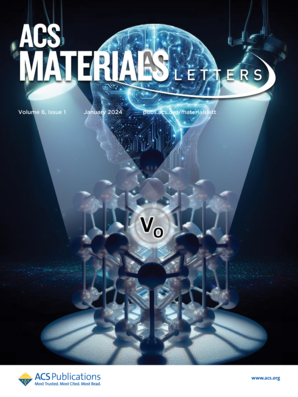超强、高耐火、可修复、可回收的氟化生物基聚酰亚胺网络
IF 8.7
1区 化学
Q1 MATERIALS SCIENCE, MULTIDISCIPLINARY
引用次数: 0
摘要
由于对石油资源的大量需求,传统的商用热固性材料目前在再加工、降解和回收利用方面面临着巨大挑战,从而造成了严重的环境负担。在我们的研究中,由可再生资源合成的试甲醛单体与 1,4-双(4-氨基-2-三氟甲基苯氧基)苯和 1,4-双(4-氨基苯氧基)苯反应,形成了一种名为 BQPs 的动态交联网络。这种含氟生物基聚亚胺材料具有优异的机械性能,拉伸强度高达 96.2 兆帕,远高于聚碳酸酯等商用塑料(65 兆帕)。此外,它还具有出色的阻燃性能,在 UL-94 测试中达到 V0 级水平,在极限氧指数测试中达到 50%。此外,它还能在 10 分钟内轻松完成高温(160 °C)再加工,并能用溶剂快速修复。总之,这种高性能含氟生物基聚酰亚胺产品将极大地促进聚酰亚胺材料的发展。本文章由计算机程序翻译,如有差异,请以英文原文为准。

Ultrastrong, High Fire Resistance, Repairable, and Recyclable Fluorinated Biobased Polyimine Networks
Traditional commercial thermosetting materials are currently facing significant challenges in terms of reprocessing, degradation, and recycling because of a large demand of petroleum resources, leading to a significant environmental burden. In our work, a trialdehyde monomer synthesized by a renewable resource reacted with 1,4-Bis(4-amino-2-trifluoromethylphenoxy)benzene and 1,4-Bis(4-aminophenoxy)benzene to form a dynamic cross-linked network called BQPs. The fluorinated biobased polyimine material exhibits exceptional mechanical properties with a tensile strength of 96.2 MPa, which is much higher than commercial plastics such as polycarbonate (∼65 MPa). Moreover, it demonstrates excellent flame retardancy by achieving a level of V0 rating in the UL-94 test and a value of 50% in the limiting oxygen index test. Additionally, it can be easily reprocessed within 10 min at high temperature (160 °C) and rapidly repaired with a solvent. Overall, this high-performance fluorinated biobased polyimine product will significantly contribute to expanding the development of polyimine materials.
求助全文
通过发布文献求助,成功后即可免费获取论文全文。
去求助
来源期刊

ACS Materials Letters
MATERIALS SCIENCE, MULTIDISCIPLINARY-
CiteScore
14.60
自引率
3.50%
发文量
261
期刊介绍:
ACS Materials Letters is a journal that publishes high-quality and urgent papers at the forefront of fundamental and applied research in the field of materials science. It aims to bridge the gap between materials and other disciplines such as chemistry, engineering, and biology. The journal encourages multidisciplinary and innovative research that addresses global challenges. Papers submitted to ACS Materials Letters should clearly demonstrate the need for rapid disclosure of key results. The journal is interested in various areas including the design, synthesis, characterization, and evaluation of emerging materials, understanding the relationships between structure, property, and performance, as well as developing materials for applications in energy, environment, biomedical, electronics, and catalysis. The journal has a 2-year impact factor of 11.4 and is dedicated to publishing transformative materials research with fast processing times. The editors and staff of ACS Materials Letters actively participate in major scientific conferences and engage closely with readers and authors. The journal also maintains an active presence on social media to provide authors with greater visibility.
 求助内容:
求助内容: 应助结果提醒方式:
应助结果提醒方式:


